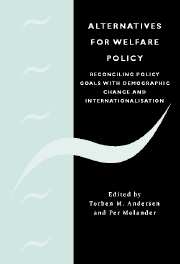Book contents
- Frontmatter
- Contents
- List of contributors
- Preface
- 1 Introduction
- 2 International integration and the welfare state
- 3 The changing age structure and the public sector
- 4 Emigration from the Scandinavian welfare states
- 5 Productivity and costs in public production of services
- 6 Use of fees in the provision of public services in OECD countries
- 7 Privatisation of social insurance with reference to Sweden
- 8 Occupational welfare
- 9 Pathways to retirement and retirement incentives in Sweden
- 10 Social insurance and redistribution
- 11 Assessing the effect of introducing welfare accounts in Sweden
- 12 Taxation in a global economy
- 13 Taxation and education investment in the tertiary sector
- 14 Debt strategies for Sweden and Europe
- 15 Policy options for reforming the welfare state
- Index
- References
11 - Assessing the effect of introducing welfare accounts in Sweden
Published online by Cambridge University Press: 22 September 2009
- Frontmatter
- Contents
- List of contributors
- Preface
- 1 Introduction
- 2 International integration and the welfare state
- 3 The changing age structure and the public sector
- 4 Emigration from the Scandinavian welfare states
- 5 Productivity and costs in public production of services
- 6 Use of fees in the provision of public services in OECD countries
- 7 Privatisation of social insurance with reference to Sweden
- 8 Occupational welfare
- 9 Pathways to retirement and retirement incentives in Sweden
- 10 Social insurance and redistribution
- 11 Assessing the effect of introducing welfare accounts in Sweden
- 12 Taxation in a global economy
- 13 Taxation and education investment in the tertiary sector
- 14 Debt strategies for Sweden and Europe
- 15 Policy options for reforming the welfare state
- Index
- References
Summary
Introduction
Sweden recently implemented a pension reform that includes a system of individual accounts giving individuals substantial flexibility in their choice of investments. At the same time, other Swedish social insurance systems such as unemployment insurance, sickness benefits and parental leave have remained unchanged. Like numerous other OECD countries, Sweden faces a serious challenge in welfare policy-making. Existing welfare benefits are associated with substantial market distortions and create disincentives to work.
This chapter examines the possible effects of introducing a large-scale welfare reform in Sweden, namely, the introduction of comprehensive welfare accounts. Under this policy, individuals make mandatory contributions to accounts, which they can top up with voluntary contributions. In return, individuals’ welfare benefits are paid from their accounts. Moving from the traditional tax-financed welfare systems to a welfare account-based system involves replacing general taxes by mandatory saving to finance the requisite welfare benefits. The welfare accounts are hence like ordinary savings accounts with two key exceptions. First, to avoid problems of moral hazard, there are restrictions on withdrawals from the welfare accounts. And second, the welfare accounts also serve a redistributive function, so that individuals receive specific minimum welfare benefits regardless of how low their account balances may be. Such accounts are in place on a comprehensive basis in Singapore, and for specific benefits such as unemployment, health and education in the US, Chile and Brazil.
In order to motivate the introduction of welfare accounts, we note that social insurance programmes involve a combination of savings, insurance and redistribution.
- Type
- Chapter
- Information
- Alternatives for Welfare PolicyCoping with Internationalisation and Demographic Change, pp. 255 - 275Publisher: Cambridge University PressPrint publication year: 2003
References
- 5
- Cited by

